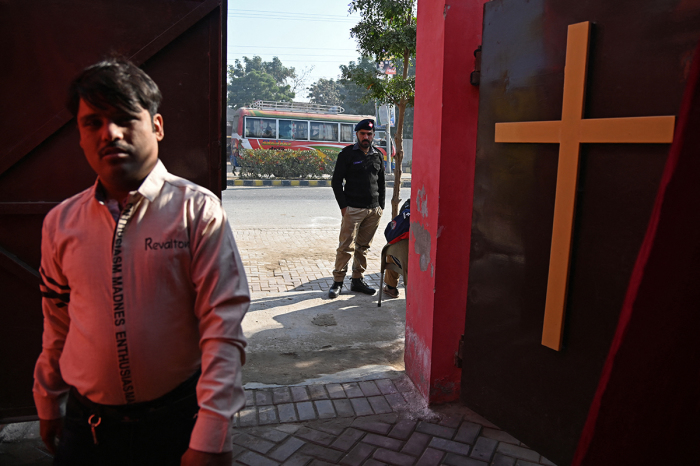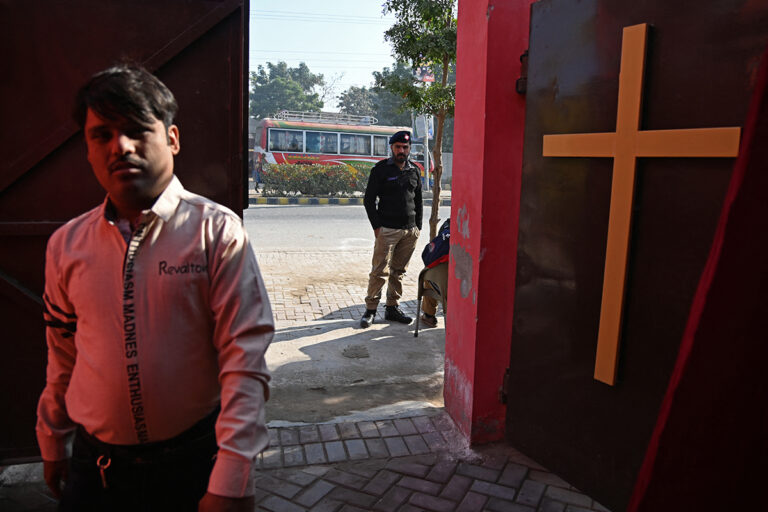
LAHORE, Pakistan — The U.S. Commission on International Religious Freedom has again recommended that the State Department designate Pakistan as a “country of particular concern,” citing the country’s blasphemy laws as a leading cause of religious freedom violations.
While the U.S. State Department does not accept all of the USCIRF recommendations when designating countries that severely violate or tolerate religious freedom each year, it has designated Pakistan as a CPC every year since 2018.
According to the 2024 USCIRF report, widespread violations of religious freedom continue to occur in Pakistan, including blasphemy laws, forced conversion of minority girls, and targeted violence against religious minorities.
Blasphemy laws, particularly Sections 295A, B and C of the Pakistan Penal Code, have been criticized as broad and vague provisions that are often misused to settle personal disputes or target religious minorities in a country that is 96 percent Muslim. The USCIRF report documents numerous cases in which individuals, including Christians, Hindus and Ahmadis, were wrongfully accused and imprisoned under these laws.
“The recent high-profile case of Zohaib Masih, a young Christian man who was wrongfully detained and tortured on false blasphemy charges, illustrates the continuing misuse of these laws,” the report said.
The report also highlights forced religious conversion, particularly affecting Christian and Hindu girls who are abducted, forcibly converted to Islam and married to their abductors – cases that often go unpunished due to societal and institutional prejudice.
Additionally, the USCIRF report noted numerous instances of violence targeting religious minorities. Attacks on places of worship, such as churches, temples, and Ahmadi mosques, remain a serious concern. The lack of an adequate government response and protection for these communities exacerbates the situation, the report noted.
USCIRF urged the State Department to designate Pakistan as a CPC, which could subject the country to sanctions and other diplomatic measures aimed at improving the country’s religious freedom situation. The committee also recommended increased U.S. support for civil society organizations working to promote religious tolerance and human rights in Pakistan.
The latest Chinese Communist Party designation puts Pakistan on the list of countries that practice or tolerate the most violations of religious freedom, following Burma, the People’s Republic of China, Cuba, Eritrea, Iran, the Democratic People’s Republic of Korea, Nicaragua, Russia, Saudi Arabia, Tajikistan, and Turkmenistan.
The Pakistani government has often denied these reports as biased and politically motivated, but USCIRF maintains its findings are based on thorough investigations and credible sources, and has called on Pakistan to make significant legal and policy reforms to address violations.
The USCIRF recommendations sparked reactions from domestic and international observers, with church leaders and human rights groups welcoming the report and calling for immediate action to protect Pakistan’s religious minorities. Azad Marshall, president of the Church of Pakistan, said the report aptly reflected the plight of religious minorities in Pakistan.
“The international community should not only pressure Pakistan to address these issues, but also assist it in every way possible,” Marshall told the Christian Daily International Morning Star News. “We want a safe, free and fair environment for religious minorities in Pakistan, and it is the state’s responsibility to meet this constitutional obligation.”
But Pakistani officials criticized the USCIRF recommendations, saying they ignored efforts the government has made to promote interreligious harmony and protect the rights of minorities.
“We are committed to ensuring the safety and rights of all our people,” a spokesman for Pakistan’s Ministry of Religious Affairs said. “We reject biased assessments that ignore our progress.”
Samson Salamat, head of rights group Rawadari Tehrik (Equality Movement), rejected the government’s stance, saying repeated acts of mob violence and continued persecution of minorities in the name of Islam contradicted its explanation.
“The US Commission on International Religious Freedom’s recommendation to designate Pakistan as a ‘country of particular concern’ underscores the urgent need to address serious religious freedom violations in the country,” Salamat told Christian Daily International Morning Star News.
He said there had been an alarming increase in alleged blasphemy cases in recent years, adding that this had also led to violent attacks on Christian sites and individuals.
A sharp rise in blasphemy cases
A recent report by the Lahore-based Centre for Social Justice said hundreds of people will be jailed on blasphemy charges in Pakistan in 2023, many based on mere accusations without evidence, with 552 people in prison in Punjab province alone.
Additionally, at least 103 people were reportedly charged with blasphemy between January and June of this year.
Government data submitted to the UN Human Rights Commission shows that blasphemy cases have risen sharply over four years, increasing by 30% from 2019 to 2020 and a further 62% from 2021 to 2023. The government report acknowledged that 53% of all complaints were false allegations (398).
Government data on charges from 2018 to 2023 acknowledges that the conviction rate under blasphemy laws is around 1%, with seven acquittals for every conviction. But all previous convictions have been overturned by Pakistan’s high courts and Supreme Court, indicating that even 1% of convictions were unfounded.
According to the report, 98.40% of those accused of blasphemy were Muslim.
Since 1987, around 100 people have been killed on suspicion of blasphemy, including 63 Muslims, 26 Christians, seven Ahmadis, one Hindu, one Buddhist and two of unknown religions.
The CSJ report also noted an increase in religiously motivated murders and lynchings over the past two years.
“At least six people suspected of blasphemy were killed by civilians in 2023,” the report added. “In addition to the two extrajudicial killings, three more people suspected of blasphemy died in prison between June 2023 and 2024. This brings the total number of people who have lost their lives on blasphemy charges to 11 in the past 18 months, including the recent incident in Madyan, Swat.”
The CSJ report also criticized the powers given to the Federal Investigation Agency to investigate cybercrimes related to the blasphemy law and to give anti-terrorism courts the authority to prosecute cases under Section 295-A of the Pakistan Penal Code.
“This has resulted in abuse of power and unfair trials,” the report said. “Hence, the number of blasphemy charges filed by the FIA has skyrocketed, while perpetrators of acts of mob violence, especially, have gone unpunished under the Anti-Terrorism Act of 1997.”
Pakistan retained its seventh place ranking as the most difficult place to be a Christian in Open Doors’ 2024 World Watch List.
Article published in Christian Daily International Morning Star News


